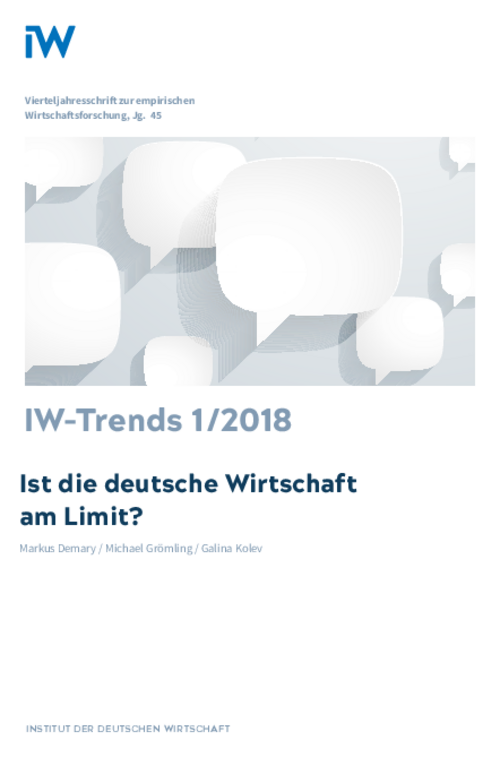The current robustness of the German economy has triggered a debate about the risk of overheating. High utilisation of aggregate production capacity does not necessarily mean an economy is overheating.

Approaches for Determining Aggregate Capacity Utilisation: Has the German Economy Reached its Limit?
IW-Trends

The current robustness of the German economy has triggered a debate about the risk of overheating. High utilisation of aggregate production capacity does not necessarily mean an economy is overheating.
For a correct diagnosis, capacity utilisation must be measured by means of a projection of gross domestic product and of potential output. The following article outlines a number of approaches that attempt to estimate the potential utilisation of the economy as a whole. Estimates of potential growth and the output gap using a Hodrick-Prescott filter suggest that in recent years, rather than overheating, the German economy has seen accelerating potential growth. Estimates based on growth accounting, on the other hand, show high utilisation of production capacities. The forecast by Oxford Economics using the Oxford Economics Global Economic Model also points to very high levels of capacity utilisation. Finally, the business cycle survey conducted by the Institute of the German Economy (IW) provides original evidence from companies on the utilisation of production capacities. In their responses, a good third of German companies speak of an overload. This results particularly from supply side factors such as the shortage of skilled staff, which is a structural rather than a cyclical problem. Policymakers should therefore not continue their endeavours to add momentum to the economy by increasing demand, but rather widen the opportunities for future growth with an economic policy that expands potential capacity.

Markus Demary / Michael Grömling / Galina Kolev: Ist die deutsche Wirtschaft am Limit? Ansätze zur Bestimmung der gesamtwirtschaftlichen Kapazitätsbeanspruchung
IW-Trends

More on the topic
China’s Trade Surplus – Implications for the World and for Europe
China’s merchandise trade surplus has reached an all-time high and is likely to rise further. A key driver appears to be a policy push to further bolster Chinese domestic manufacturing production, implying the danger of significant overcapacities.
IW
What if Trump is re-elected?
A possible re-election of Donald Trump as US president in November 2024 could entail a significant upheaval for the world trading order, if he fulfills his announcements to raise tariffs, mainly in order to reduce the US trade deficit.
IW